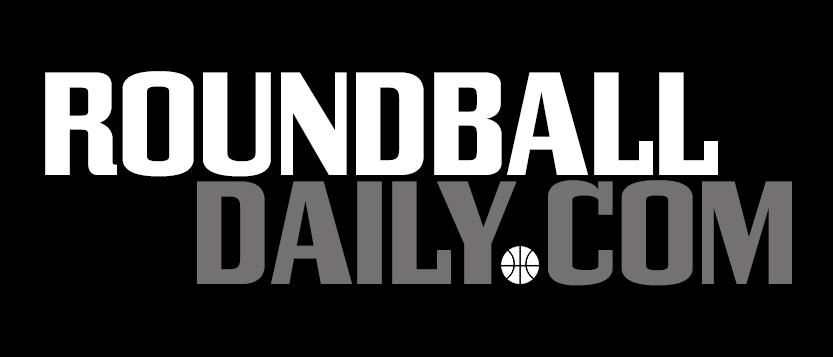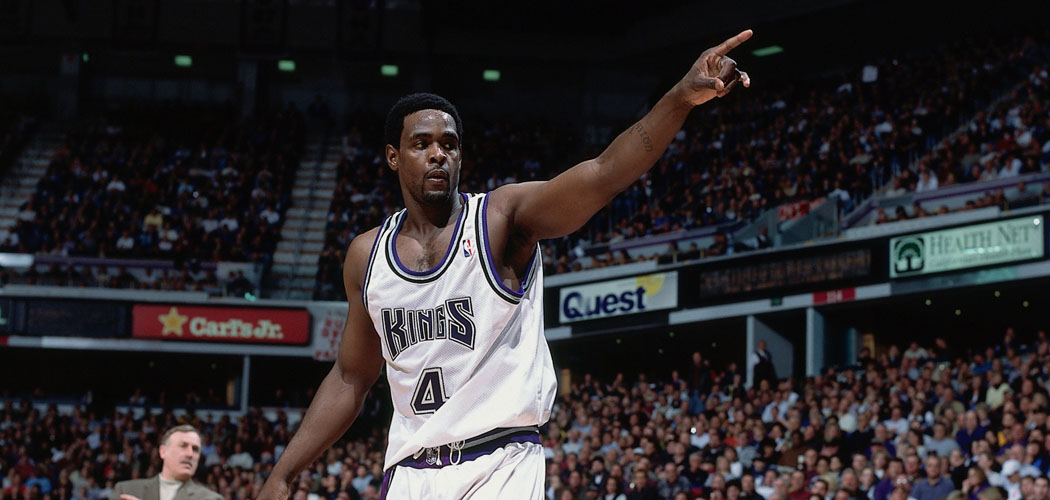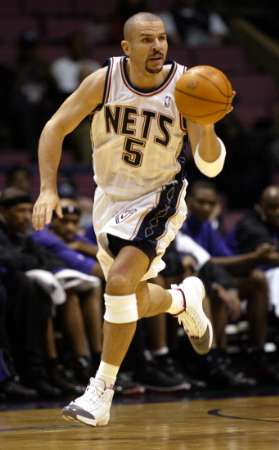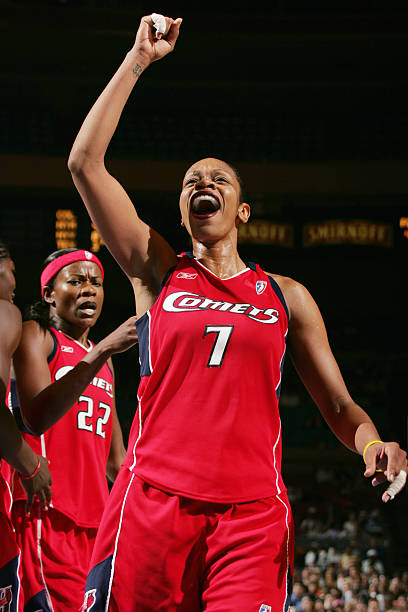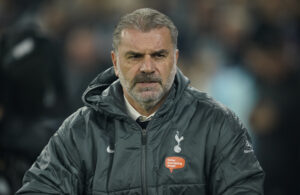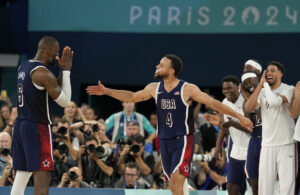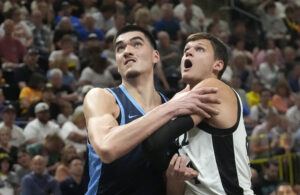- Attacking style not the only reason some Tottenham fans will back Ange Postecoglou until the bitter endPosted 5 months ago
- Paris Olympics takeaways: What did Team USA’s crunch-time lineup say about NBA’s hierarchy?Posted 10 months ago
- Zach Edey posted an easy double-double in Summer League debut. Here’s why he’ll succeed in NBAPosted 11 months ago
- What will we most remember these champion Boston Celtics for?Posted 12 months ago
- After long, seven-year road filled with excruciating losses, Celtics’ coast to NBA title felt ‘surreal’Posted 12 months ago
- South Florida men’s basketball is on an unbelievable heater– but also still on the bubblePosted 1 year ago
- Kobe Bufkin is balling out for Atlanta Hawks’ G League team. When will he be called up to NBA?Posted 1 year ago
- Former Knicks guards Immanuel Quickley, RJ Barrett may yet prove Raptors won the OG Anunoby tradePosted 1 year ago
- Rebounding savant Oscar Tshiebwe finally gets NBA chance he’s deserved for yearsPosted 1 year ago
- Is Tyrese Maxey vs. Tyrese Haliburton the next great NBA guard rivalry?Posted 2 years ago
Why Chris Webber deserves to be in the Basketball Hall of Fame, plus who else should get in
- Updated: February 22, 2018
The Basketball Hall of Fame has announced its 13 finalists for induction in the 2018 class, and for the second straight year, Chris Webber is on the ballot.
The former Sacramento Kings star and should-be 2002 NBA champion has an incredible resume–from leader of the Fab Five to five-time All-Star, with career averages of 20, 10, nearly 5 assists, 1.5 blocks and 1.5 steals per. He led the league in rebounds, finished on the first or second team four times, and scored 20+ points per in a season nine straight years (’94-03).
For some reason though, whether it’s the way he handled the media, the allegations that he took money from a Michigan booster (oh, the humanity!), or the timeout in the 1993 NCAA championship game, C-Webb gets a bad rap.
We’re sick of it.
If Yao Ming, Ralph Sampson and Arvydas Sabonis are in the Hall, we’re sorry–C-Webb needs to be there, too. ASAP.
It’s time to give this man his due–and the jacket that comes along with it.
Here’s a look at the rest of the Hall of Fame field, and who we think should get in:
Jason Kidd: Lock.
There’s no doubting J-Kidd’s Springfield credentials. The man ranks second all-time in both assists (12,091) and steals (2,684), trailing, in both cases, only John Stockton (15,806 and 3,265).
He’s also third all-time in triple doubles (107), behind only Magic Johnson and Oscar Robertson, and though he wasn’t known as a knock-down three-point shooter, ninth all-time in three pointers made.
The 10-time All-Star, NBA champ (with the 2011 Mavericks) and gold medalist is also the only guy to make the New Jersey Nets relevant. So, yeah, he’s going to get that orange jacket.
Steve Nash: Lock.
The two-time MVP and eight-time All-Star will have no trouble getting in, either. Nash ranks third all-time in assists (10,335), and is the NBA’s all-time leader in free throw percentage (90.4%).
He also ranks 18th all-time in three-pointers made (1,685), and knocked those down at a 43% clip, which ranks in the top 10 all-time.
With the Suns from 2004-07, Nash averaged 17.6 points and 11.2 assists per game.
Ray Allen: Lock.
The NBA’s all-time leader in three-pointers made is about as automatic as he was with an open look from behind the arc. Allen knocked down 2,973 threes in his brilliant 18-year carer, shooting at a 40 percent clip.
He also ranks 24th all-time in points scored, having tallied 24,505.
The 10-time All-Star and 2-time NBA champion also set the record for the most threes in an NBA Finals game in 2010, with eight.
Chris Webber: Should be in.
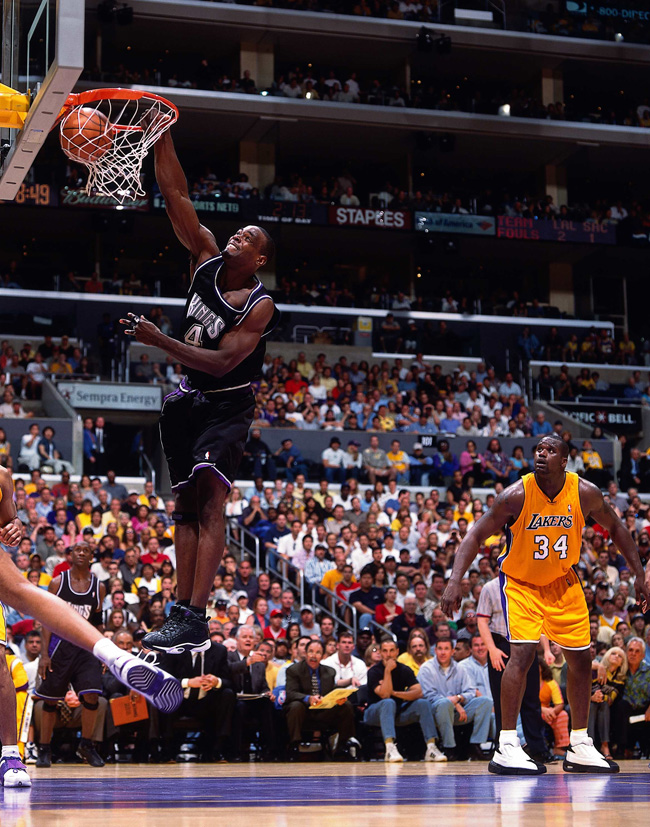
C-Webb averaged 20, 10, and nearly 5 assists for his career. (Photo by Andrew D. Bernstein/NBAE via Getty Images)
Imagine there was this 6-9 power forward who ran the floor like a guard, went to the rack with King-of-Jordan-like authority, and had 20/15 court vision.
Imagine he led a cultural revolution as a freshman in college, as the leader of one of the most memorable, most expressive, and most impactful teams of all-time.
Then imagine he went to the NBA, averaged 20, 10, nearly 5 assists, 1.5 steals and 1.5 blocks per game over a 15-year career, including a monster season in which he put up 27, 11, 1.3 and 1.7.
We won’t even mention that his team was screwed out of the 2002 NBA championship, and that that team changed the way basketball was played and paved the way for the success of teams like the Golden State Warriors.
That guy should be a Hall of Famer, right?
It’s not even a debate, right?
Not to go all Spike Lee on you, but do the right thing, voters.
Grant Hill: Might need to wait.
Hill was a terrific player, a 19-year NBA veteran and a 7-time All-Star, but his career numbers (16.7 ppg, 6 rpg, 4 apg) don’t jump out at you as “first-ballot Hall of Famer.”
The injuries certainly hurt him, as he was never quite the same after a broken ankle cost him the 2003-2004 year. Before then, he was well on his way to Springfield–especially after a career-best 1999-00 campaign when he put up 25.8 ppg, 6.6 rpg, and 5.4 apg.
Still, you can’t make the case for Hill getting in and not Webber,
Maurice Cheeks: Should (eventually) get in.
His career numbers (11.1 ppg, 6.7 apg) definitely don’t jump off the page, but Cheeks was a large part of the Sixers’ 1983 championship squad, which is remembered as one of the best teams of all-time. He retired fifth on the NBA career list for both assists (7,392) and steals (2,310), and was a four-time All-Star and four-time All-Defensive team selection.
Katie Smith: Should be in.
Smith is a WNBA Finals MVP (2008) and two-time WNBA Champion with the Detroit Shock (2006, 2008). A native of Ohio, Smith played for the Ohio State University (1992-1996) where she was named Big Ten Player of the Year (1996). In 2001, she was the first female Buckeye athlete to have her number retired.
Tina Thompson: Lock.
One of the greats of the WNBA’s first dynasty, the four-time champion Houston Comets and part of the league’s first Big 3 (with Sheryl Swoopes and Cynthia Cooper), Thompson is an absolute lock to get in. She was named one of the WNBA’s 20 Greatest Players in 2016.
Lefty Driesell: Should be in.
“The Lefthander” is the only coach in NCAA history to win 100 games at four different schools and just one of 11 coaches to lead four schools to the NCAA Tournament. He is the only coach in NCAA history to be named Conference Coach of the Year in four different conferences and is known at the inventor of the “Midnight Madness” concept.
He also ranks 12th among Division I coaches in all-time victories with an overall coaching record of 786-394.
Rudy Tomjanovich: Should be in.
The head coach of the two-time NBA champion Houston Rockets (1994, 95) is one of three coaches to win both an NBA title and a gold medal, which he won in 2000 in Sydney.
He’s also the only person in NBA history to score 10,000 career points as a player and win 500 career games.
Kim Mulkey: Should be in.
She built the basketball program at Baylor, winning two national titles (2005, 2012) and coaching Brittney Griner. She ranks also third all-time among head coaches in winning percentage, and is the first person in history to win women’s basketball titles as a player, an assistant, and head coach.
Hugh Evans: ?
He’s a ref.
Wayland Baptist University Women’s Basketball Team: Lock.
This squad was the UCLA of women’s basketball back in the day, even before UCLA was UCLA. The team won 131 straight games from 1953-58, including 10 national championships (1954, 1955, 1956, 1957, 1959, 1961, 1970, 1971, 1974, 1975). This was in an era before women’s basketball was an NCAA sport (that happened in 1982), so all those records UConn is setting now? They’d be breaking Wayland Baptist’s marks.
Also see:
